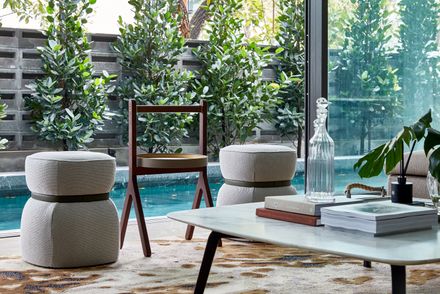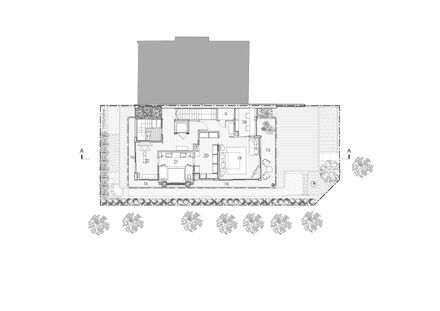LIFT
Meyer Engineering Private Limited
LOCATION
Singapore
PHOTOGRAPHS
Aaron Pocock
LEAD ARCHITECTS
Wong Chiu Man, Mak Hon Yue
MANUFACTURERS
Autodesk, Flexform, Hansgrohe, B&B Italia, Duravit, Gessi, Kawajun, Mafi, Minotti, Poliform, Poltrona Frau, Act 3D, Omar Khan Rugs, Robert Mcneel & Associates, Trimble Navigation, Igeo
LANDSCAPE
Nyee Phoe Flower Garden Pte Ltd
ENGINEERING
CMP Consultants Private Limited
CONSULTANTS
CCL Chartered Surveyors, ATLV
ACMV
GSL Engineering Works Private Limited
CATEGORY
Houses, Houses Interiors, Sustainability
ALUMINIUM DOORS & WINDOWS
Lital Materials & Contract Engineers Private Limited
DESIGN TEAM
Wong Chiu Man, Mak Hon Yue, Xavier Tan, Aileen Peh, Irene, Cielo Kavundan
YEAR
2018
POOL SPECIALIST
Saquaries Co. Private Limited
HOME AUTOMATION
The Automated Lifestyle Private Limited
Text description provided by architect.
Camo House is located on a leafy residential street on the east coast of Singapore. Situated within a dense neighborhood, the building design represents the client’s love of the surroundings and the desire for a house that blends in and not stand out.
The house is designed to ensure visual privacy of the residents with green design strategies in place to provide comfort and transform the living quality of the residents.
At the same time, the residents did not want to have the strong sunlight from the east and west-facing facades to penetrate deeply into the rooms, especially in the early mornings and late afternoons when the sea breeze comes through the neighborhood.
Thus, these criteria became the parametric considerations when designing the façade. It comprised of a perforated aluminium screen where the details for different times of the day, and weather conditions were developed and determined with the use of software programs Igeo and Grasshopper.
Thus, an urban camouflage tactic was adopted, in which the foliage inspired double skin façade integrates with its surroundings.
This foliage imagery is generated based on the pattern derived from a photographic montage of the surrounding trees and street-scape.
On top of this graphic, it is mapped with the visual and climatic patterns derived from desired zones of maximum and minimum visual transmission and airflow.
The perforations of the double skin façade help to regulate the temperature of the step out decks and reduce the temperature of interiors.
It is also designed to have the option of fully opened sliding doors for cross ventilation and semi-open options especially on humid or stormy days.
The extent of perforation is controlled by the sizes of apertures, and they are angled to shield out the early morning and late afternoon sun. Thus the heat load and air conditioning of the house is minimized and cooling is accomplished through cross ventilation.
The interior of the house is made up of a series of well-proportioned living spaces. On the ground floor, the living and dining room seamlessly open into a lush garden and lap pool, where a micro-climate is created by adopting a breeze block wall and landscaping.
This wall is capable for cooling and privacy thus welcoming natural ventilation into the interiors allowing it to be used as a completely open space.
The family room on the second floor then transforms into a hospitality guest suite and the corridors become gallery libraries.
Finally, the house opens onto the roof terrace with panoramic views of the neighborhood, with large planters of dense landscaping and trees, providing shade and helps to cool down the house in a tropical climate.
Camo House is systematically connected to the environment through green design strategies. In time, together with the screen and trees of the street-scape, the house is envisaged to blend in to the environment and become part of the urban landscape.

























